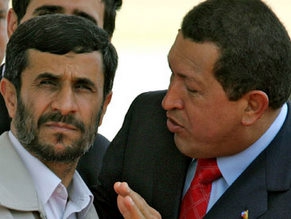|
World Jewish News

Hugo Chávez with Iranian leader Mahmoud Ahmadinejad. Photograph: Juan Barreto/AFP/Getty Images
|
Iranian president tours US foes in Latin America
08.01.2012, Israel and the World Iranian President Mahmoud Ahmadinejad, under growing pressure from debilitating Western economic sanctions, starts a Latin America tour Sunday aimed at shoring up ties with his few remaining allies.
Ahmadinejad will meet fellow US foe and firebrand Venezuelan President Hugo Chavez during a four-nation trip that coincides with rising international concern over Tehran's nuclear ambitions.
The Iranian leader will arrive in Caracas late Sunday, kicking off a five-day trip that will on Tuesday see him attend the inauguration of the recently re-elected Nicaraguan leader Daniel Ortega.
Stops in Cuba and Ecuador will round off the tour.
All four countries have frosty ties with the United States and their leaders have in the past four years made numerous Tehran visits to build up diplomatic and business links while relations with Washington have worsened.
Just before leaving Iran, Ahmadinejad said that all the countries on his itinerary "resist the oppression" of the United States and share "an anti-colonialist view," according to the Fars news agency.
"Latin America is a region that the oppressive regime (the United States) sees as its backyard where it can do as it likes. But today the people have awoken and are acting independently," he said.
Ahmadinejad called Chavez "a hero in the struggle against the oppression", said Ortega was leading a "revolution (that) is the same as the Iranian revolution", and praised Ecuador's ruling "revolutionaries who battle the (US) regime of domination".
He said he planned to sign deals in all the countries, including Cuba.
Ahmadinejad's international affairs director, Mohammad Reza Forqani, earlier said the visit to "what used to be called the backyard of America shows the dynamism of the Islamic Republic of Iran's diplomacy in the world arena."
The trip also "invalidates the claims of the enemies," Forqani was quoted as saying by Iranian state media on Tuesday, in a clear jab at Washington.
Officials in Ecuador meanwhile confirmed that Ahmadinejad would visit the South American nation on Thursday, in the Iranian leader's second visit since attending President Rafael Correa's inauguration in 2007.
Ahmadinejad will talk with Latin American leaders about "bilateral ties and regional and international issues," according to Iran's official IRNA news agency.
The United States has urged Latin American countries not to deepen ties with Iran.
"As the regime feels increasing pressure, it is desperate for friends and flailing around in interesting places to find new friends," State Department spokeswoman Victoria Nuland said when asked about Ahmadinejad's trip.
Carlos Romero, a retired international relations professor at the Central University of Venezuela, said Ahmadinejad was "trying to find oxygen in Latin America," while links with other states continue to spiral downwards.
"His country is in a very complicated state internationally and is challenged internally by ever more protests on social networks" over the regime's repression of human rights at home and failure to denounce abuses in Syria, Romero said.
While the international community and many neighbouring states have condemned Syrian President Bashar al-Assad's months-long crackdown on protesters, ally Ahmadinejad has remained steadfastly loyal to the Damascus leadership.
The Iranian president will be accompanied on the Latin America trip by his foreign, trade, commerce and mines and energy ministers.
Ahmadinejad, who last came to Venezuela in November 2009, was scheduled to visit Caracas in September 2011 but the trip was postponed because Chavez was diagnosed with cancer. The Venezuelan leader, who has since declared himself free of the disease, last visited Iran in October 2010.
But the region's economic powerhouse, Brazil, is notably absent from Ahmadinejad's itinerary.
Lytton Guimaraes, an expert on Latin America at the University of Brasilia, said the omission indicated that President Dilma Rousseff was adopting a much cooler approach to Iran than that of her predecessor Luiz Inacio Lula da Silva.
"Brazil is not going to defend Iran, but nor will it attack it. It's going to sit still," Guimaraes told AFP.
by: Anna Pelegri
EJP
|
|
